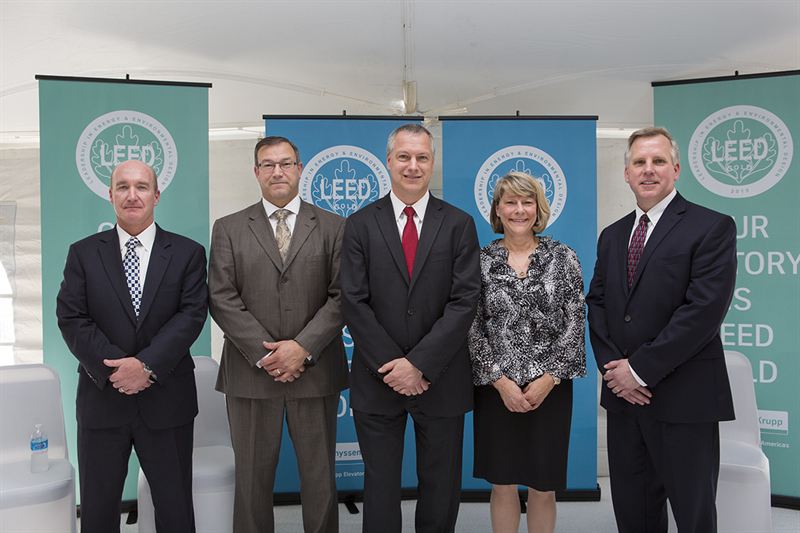ThyssenKrupp Celebrates Sustainability at Tennessee Factory’s LEED ® Gold Certification Event

Yesterday, ThyssenKrupp Elevator celebrated the company’s Leadership in Energy and Environmental Design (LEED) for Existing Building: Operations and Maintenance Gold Certification by the U.S. Green Building Council (USGBC). With almost 1,000 distinguished guests, company executives and employees in attendance, the event highlighted the companies continued commitment to the environment and the communities in which it operates.
“Today we recognize the great accomplishment of our Americas team,” said ThyssenKrupp Elevator AG CEO, Andreas Schierenbeck. “We see investment in sustainability as an essential component of our future success. By achieving this LEED Gold certification, we are investing in our employees’ health and safety, in our community and in our partnership with the State of Tennessee.”
The four-hour event included factory tours highlighting major achievements of the LEED Gold certification, speeches and a luncheon for the plants’ 750 plus employees.
“ThyssenKrupp Elevator’s long history of excellence in sustainability, paired with a steadfast dedication to employee health and safety, make it a worthy recipient of this prestigious certification,” said Lori Munkeboe, director of Tennessee Department of Environment and Conservation’s Office of Sustainable Practices. “LEED Gold Certification cements ThyssenKrupp as a leader in Tennessee’s green economy and has set the standard for facilities looking to improve indoor air quality and reduce energy consumption statewide.”
Improvements made to the almost 50-year old factory include:
- The amount of outside air to ventilate the space was increased by ~216,000,000 cubic feet per day.
- Upgrades to the HVAC system, the new building management system and ventilation as well as lighting improvements save 3,317,684 kilowatt hours of electricity per year -- enough to power all the homes in Middleton, Tennessee all year long.
- The integration of efficient bathroom fixtures and native plants which eliminated outdoor irrigation will save 620,000 gallons of water annually.
- 97 percent of all waste generated at the facility is diverted from landfills.
“Several years ago we set goals to minimize our impacts on the environment, reduce waste and provide greener solutions to our customers,” said Rich Hussey, president and CEO of ThyssenKrupp Elevator Americas. “Since then, over 150 of our employees have passed the LEED Green Associates exam; we are transitioning our service fleet to alternative fuel and high efficiency vehicles and have received third-party confirmation that this facility produces among the most energy efficient elevators in North America.”
ABOUT LEED
Leadership in Energy and Environmental Design (LEED) is a rating system developed by the USGBC, which promotes a whole-building approach to sustainability by recognizing performance in five key areas of human environmental health: sustainable site development, water efficiency, energy efficiency, materials selection and indoor environmental quality. The Green Building Rating System is the internationally accepted benchmark for the design, construction and operation of high-performance green buildings.
Globally, approximately 100,000 projects are already certified or registered in accordance with the LEED, BRE Environmental Assessment Method (BREEAM) or regional green building standards. Many other international projects are making use of safe and energy-efficient technologies without undergoing a specific certification process. Companies like ThyssenKrupp are instituting sustainability into their core business plans by improving resource usage, efficiently managing waste, and investing in green customer solutions, which in some cases go well beyond LEED certification requirements. Since 40 percent of all energy worldwide is consumed in buildings, smart buildings using energy-saving equipment have a tremendous impact on global energy consumption.
On average, new elevator technologies such as the ThyssenKrupp TWIN elevators can save up to 27 percent of energy when compared with other technologies, and reduce the electrical power required by half. This leads to lighter and simpler power supply systems. In addition, elevators can also operate as power generators. Regenerative drives, which use energy created when the cabins slow down (converted into electricity and fed back into to the building’s power grid), reduce energy needs for the building by approximately 30 percent. The cost saving implications of these technologies is immense. In the case of ThyssenKrupp elevators used in the new One World Trade Center in New York, the energy generated through elevator use is enough to feed the lighting system of the entire building.
Sasha Bailey, LEED AP BD C
Strategic Communications Manager
ThyssenKrupp Elevator Americas
Mobile: 1 (469) 236-6290
E-mail: sasha.bailey@thyssenkrupp.com
ABOUT THYSSENKRUPP
ThyssenKrupp Elevator Americas is the largest producer of elevators in the Americas, with more than 15,500 employees, in more than 230 branch and service locations. ThyssenKrupp Elevator Americas oversees all business for the operations in the United States, Canada, Central and South America. It is a subsidiary of ThyssenKrupp Elevator AG.
ThyssenKrupp, a global technology and materials group headquartered in Essen, Germany, employs around 155,000 people in just under 80 countries. In the fiscal year 2013/2014, ThyssenKrupp generated sales of more than €9 billion (approximately $11.4 billion) in North America and employed more than 20,500 people. In North America, ThyssenKrupp oversees more than 40 companies in the United States, Canada and México; its companies offer a range of products including: premium carbon steel, high-performance alloys, automotive components, elevators, escalators, material trading, handling and logistics, plant construction and industrial services.
Tags:





